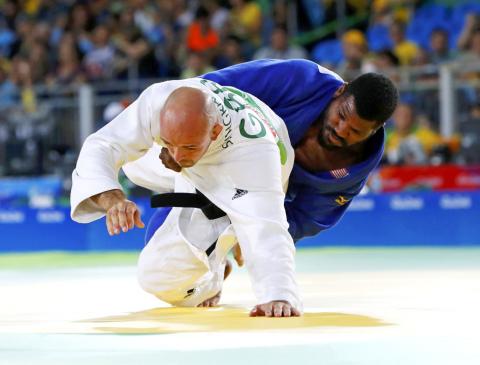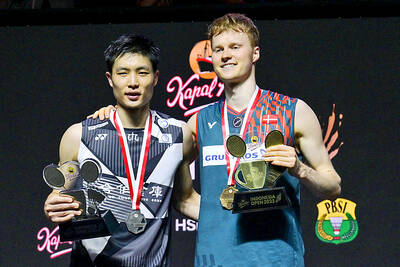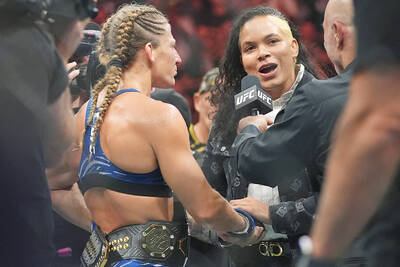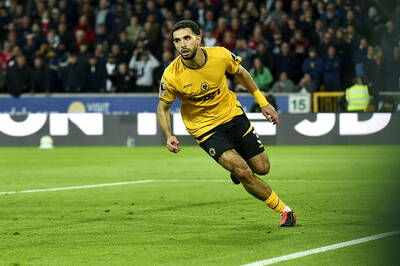Being in a fight with an invisible attacker might sound like a nightmare, but Christella Garcia, a medal-winning, blind Paralympian judoka, says it is “wonderful.”
“It makes perfect sense,” Garcia told reporters right after defeating Brazil’s Deanne Almeida for bronze in the over 70kg category in Rio de Janeiro on Saturday.
Garcia, who has been almost completely blind from birth, said that out on the judo mat, where opponents try to outwit, unbalance and throw each other, her disability no longer matters.

Photo: Reuters
“You’re gripping and you feel your opponent’s body and the way they’re moving,” Garcia, 37, said. “It’s about who wants it the most.”
Judo in the Paralympics is reserved for the visually impaired — some with limited eyesight, others like Garcia with virtually none. There are surprisingly few changes to the way the regular sport is played.
Contestants unable to see the boundaries might unwittingly spill outside, so the referee has to guide them back. And unlike in regular judo, where the clock is visible, a loud buzzer goes off at the one-minute warning before the bout ends.
Otherwise, the combatants in their white or blue kimonos fight as skillfully and fiercely as those with proper vision. It can be easy to forget they are blind at all — until the incongruously gentle scene of a referee leading a black belt fighter around by the hand.
Another US bronze medal winner on Saturday, Dartanyon Crockett, only took up judo when he left high school.
Learning a sport in which being propelled through the air or choked while lying on the mat are integral parts was not easy for a young man born blind.
“Part of doing judo for the visually impaired is putting yourself in a scary, uncomfortable situation,” 25-year-old Crockett said. “It’s about stepping out of your comfort zone.”
His coach, Eddie Liddie, said teaching is also a huge challenge in a sport involving scores of techniques, many of them only subtly different from each other.
“I’m so used to demonstrating so that they can see it,” he said of his normal coaching procedures. “What I learned to do was to put their bodies into certain positions and then have them doing it by repetition.”
However, once beyond that steep learning curve, judo can become remarkably natural for the blind.
What is probably the most important difference between Paralympic and regular judo is that judoka keep a grip on their opponent at all times, rather than breaking away and re-gripping as normal judoka would.
This means two blind athletes literally hold on to each other.
Venezuela’s Naomi Soazo, who won gold in Beijing and bronze in Rio, said that connection is the starting point.
“When you hold them, you feel their movements. Then it’s intuition and feeling about where they’re going,” she said.
In fact, provided she has gripped onto her opponent, she can match another black belt of her level with perfect eyesight.
“There’s no difference,” she said.
And that self-confidence spreads far beyond the judo mat.
Garcia said that mastering judo has helped her win the fight of her own life.
“[Now] I don’t consider being blind a disadvantage,” she said. “It’s just a characteristic: I’m a girl. I have black hair. I love cupcakes — and I’m blind.”

Badminton world No. 3 Anders Antonsen clinched his first Indonesia Open title yesterday after beating Taiwan’s Chou Tien-chen, while South Korea’s An Se-young won her second championship in Jakarta. The 28-year-old Dane sank world No. 7 Chou at the Indonesian capital’s Istora Senayan arena, winning 22-20, 21-14 in a 60-minute match to secure the prestigious Super 1000 event. Antonsen came out on top in a tightly contested first game before cruising to victory in the second. In a more closely fought women’s singles final, South Korean ace and world No. 1 An fought back from one game down to beat China’s

Italy crashed to a 3-0 loss away to Norway, as the four-time FIFA World Cup champions made a disastrous start to their 2026 World Cup qualifying campaign on Friday, while Belgium had to settle for a draw in North Macedonia. Alexander Sorloth, Antonio Nusa and Erling Haaland all scored in the first half in pouring rain in Oslo as Norway made it a night to forget for Italy, who missed out on the past two World Cups. “I have no explanation. Our supporters don’t deserve this kind of match. We need to do some soul-searching. It’s unacceptable,” Italy captain and goalkeeper Gianluigi

‘STILL’: In front of a packed New Jersey arena attended by Donald Trump and Mike Tyson, UFC 316 delivered high drama as Merab Dvalishvili retained his title Georgia’s Merab Dvalishvili scored a second-round submission win over Sean O’Malley to retain his bantamweight title at Ultimate Fighting Championship (UFC) 316 on Saturday, with Kayla Harrison also winning by submission in the co-main event, tapping out Juliana Pena to claim the women’s bantamweight crown. In front of a packed crowd at the Prudential Center in Newark, New Jersey, which included US President Donald Trump and retired heavyweight great Mike Tyson, Dvalishvili, a 34-year-old from the country of Georgia, won the belt in a convincing, although not aesthetically pleasing, unanimous decision. Dvalishvili (19-4) sat on top of the cage and shouted

Manchester City on Monday completed the signing of left-back Rayan Ait-Nouri from Wolverhampton Wanderers for a reported £31 million (US$41.8 million). The 24-year-old Algeria international has signed a five-year contract and will be available for the FIFA Club World Cup, which begins later this week. Ait-Nouri is expected to be just one of a trio of new City faces for that tournament with deals close to completion for AC Milan midfielder Tijjani Reijnders and Olympique Lyonnais playmaker Rayan Cherki. After missing out on a major trophy in the recently completed season for the first time since 2016-2017, City are hoping